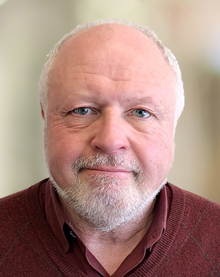Printed in the Summer 2023 issue of Quest magazine.
Citation: Smoley, Richard, "From the Editor's Desk" Quest 111:3, pg 2
 The theme of a brotherhood that works in secret for the advancement of humanity has fascinated people for centuries.
The theme of a brotherhood that works in secret for the advancement of humanity has fascinated people for centuries.
Stephan Hoeller’s article in this issue ably outlines the history of this idea, including the role of the Theosophical Society in advancing it. Some have thought of this brotherhood as a kind of secret government of humanity. But as Hoeller notes, there is one definitive objection to this belief: “The sorrowful course of history, the fierce expressions of a ‘blind world-creating will’ . . . does not intimate the handiwork of such intelligences. If there is an ‘inner government’ or a ‘secret directorate,’ it would have to be a rather ineffectual one.”
One might counter that these adepts are working with the raw material of human nature, which includes not only free will but a compendium of instincts that are often violent and cruel. Yet even if we set aside the notion of some unseen directorate of humankind, there may be more to the concept of hidden brotherhoods than meets the eye.
Ernest Scott’s book People of the Secret discusses the history of this idea. He makes a striking comment about the brotherhood’s use of telepathy: “Telepathic powers are currently used, and have been used throughout the whole of human cultures in such a way that tension and rivalry are maintained. This offsets natural inertia and ensures that cultures attain their norm of productivity over an historical period.”
Scott adds something even more startling. He quotes one anonymous adept: “Since we have prescience as well, it can be stated that the necessary effort and ingenuity to accomplish the art of telepathy will not be marshalled during the entire foreseeable period of generations in which this power could be a significant aid to humanity.’”
Are some occult brotherhoods working against a widespread belief in—and use of—human psychic powers?
If we tentatively accept this idea, it brings many otherwise inexplicable things into focus, notably the obstinate resistance of the scientific community and the mainstream intelligentsia to accept the reality of psychic phenomena, even though it has been repeatedly demonstrated scientifically. (For more on this topic, see Quest, winter 2023, containing Mitch Horowitz’s article and my editorial.)
Putting this into perspective, we can suppose that there are at least two hidden brotherhoods: one familiar from Theosophical and similar literature, which is working ceaselessly to advance human evolution, and another, which is equally set on retarding it.
To look at this possibility in a reasonable way, it would be useful to set aside preconceptions of “light” and “dark” brotherhoods, good and evil respectively. Rather it would make more sense to see these two hidden forces as resembling an automobile, which has to have both an engine for moving it forward and a braking system to stop when necessary. We could also consider that this tension may account for the convulsions of history.
Historical events are often naively categorized into Good Things and Bad Things, but a closer look reveals that they are nothing of the kind. Some of the greatest atrocities have had beneficial results. The horrors of the two world wars are well known, but they did break the backs of the colonial empires under which much of the human race had been suffering. Similarly, some of the greatest advances have been accompanied by ruinous side effects. The scientific revolution of the past 250 years has provided countless medicines and increased food production to a level that would once have been considered miraculous, but has also brought about environmental desecration on a global scale.
One esoteric name for the earthly level on which we live is the mixtus orbis: the “mixed globe,” where good and evil are inseparable. It is said—and I believe it myself—that there are other realms and dimensions where this dynamic does not apply, but whatever and wherever they are, they are not here.
You may feel outraged by the thought of a secret brotherhood that is trying to impede humans’ awareness of their own potential. Consider this: at this point it is by no means clear that humanity can use nuclear energy wisely and responsibly. What, then, of the power of the mind, which is infinitely superior? To put the matter more concretely, do you want everybody going around able to read everyone else’s thoughts and move objects by the sheer force of will? For that matter, do you yourself really want to know what’s going on in other people’s minds? Maybe you do, and maybe you don’t.
In the end, I come down on the side of the existence of hidden brotherhoods—one or many—as long as we can accept that their views of what is good and bad, wise and foolish, may have little resemblance to ours. As we read in Isaiah 55:8, “My thoughts are not your thoughts, neither are your ways my ways, saith the Lord.”
Richard Smoley

